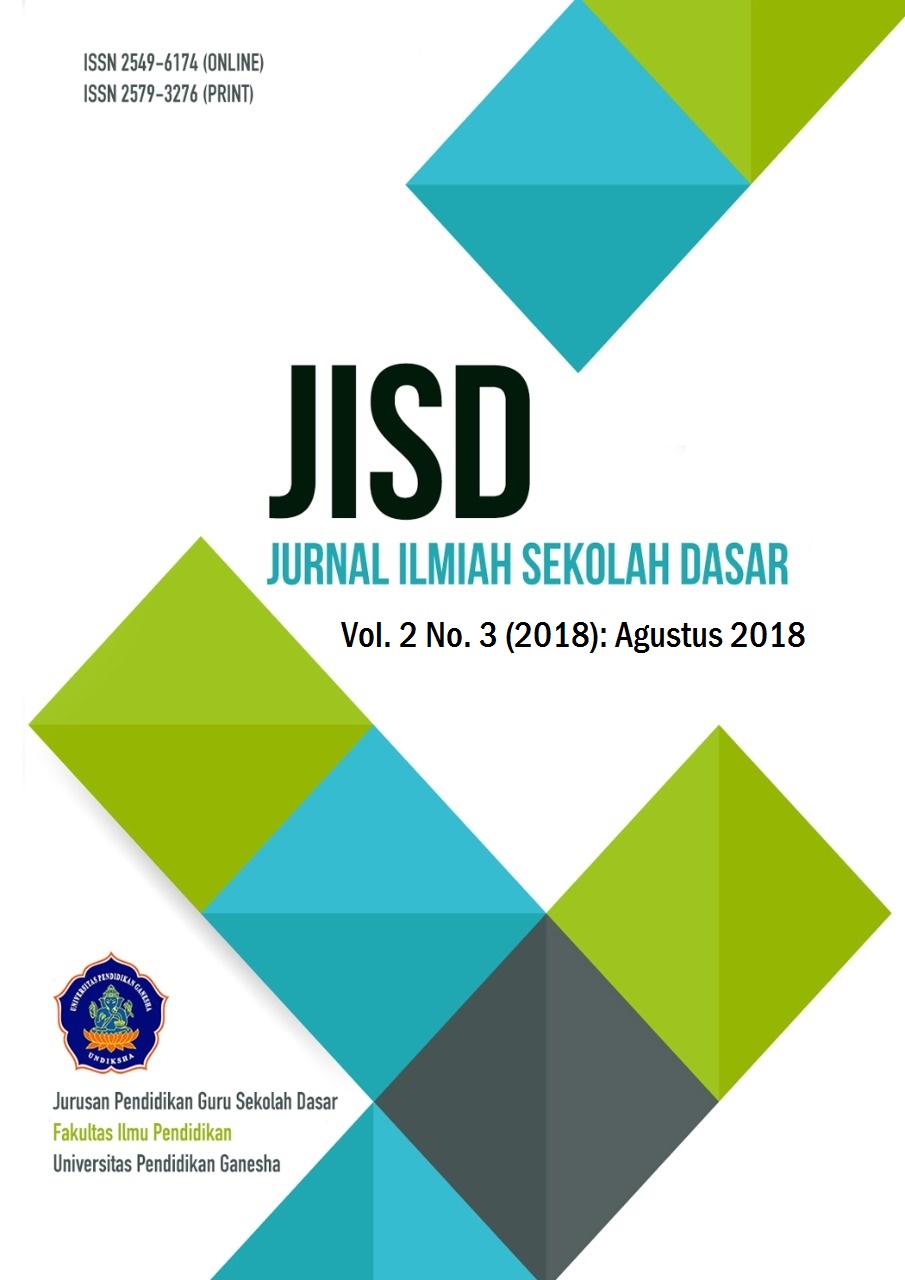Penerapan Model Pembelajaran Problem Based Learning untuk Meningkatkan Motivasi Belajar IPA
DOI:
https://doi.org/10.23887/jisd.v2i3.16138Abstract
This research aimed at implementing problem based learning model to improve students’ learning motivation in science. The subjects of this classroom action research were 25 students in Grade VI, semester I, academic year 2016/2017 in SD No.1 Darmasaba. Students’ interests were collected using questionnaire and analyzed descriptively. Result showed that after implementing problem based learning model in Cycle I, students’ motivation reached 104.96 which was categorized as highly motivated. Students’ classical completeness was 76%. After Cycle II, students’ motivation reached 121.68 which were categorized as very highly motivated. Students’ classical completeness were 96%. Thus, it is concluded that problem based learning model can be implemented to improve students’ motivation in scienceReferences
Agung, A.A Gede. 2005. Metodelogi Penelitian Pendidikan. Singaraja: Fakultas Ilmu Pendidikan Institut Keguruan dan Keilmuan Negeri Singaraja.
Agung, A.A Gede. 2014. Metodologi Penelitian Pendidikan. Yogyakarta: Aditya Media Publising.
Depdiknas, 2006. Kurikulum Tingkat Satuan Pendidikan. Jakarta: Depdiknas.
Dewantara, D. (2014). Penerapan Model Pembelajaran Problem Based Learning Untuk Meningkatkan Aktivitas Dan Hasil Belajar Siswa Pada Pelajaran IPA (Studi Pada Siswa Kelas V SDN Pengambangan 6 Banjarmasin). Jurnal Paradigma. Volume 11 Nomor 2 Juli 2016, 41 - 44.
Dewi, K. A. P., Gading, I. K., & Sudana, D. N. (2016). Pengaruh Model Pembelajaran Problem Based Learning (PBL) Terhadap Hasil Belajar IPA Siswa Kelas IV SD. MIMBAR PGSD Undiksha, 4(1).
Giarti, S. (2015, November). Peningkatan Keterampilan Proses Pemecahan Masalah dan Hasil Belajar Matematika Menggunakan Model PBL Terintegrasi Penilaian Autentik Pada Siswa Kelas VI SDN 2 Bengle, Wonosegoro. In Prosiding Seminar Pendidikan Ekonomi dan Bisnis (Vol. 1, No. 1).
Gunantara,Gd, Md Suarjana, dan Pt. Nanci Riastini. 2014. Penerapan Model Pembelajaran Problem Based Learning Untuk Meningkatkan Kemampuan Pemecahan Masalah Matematika Siswa Kelas V. Jurnal Mimbar PGSD Universitas Pendidikan Ganesha. Vol. 2, No. 1.
Indah, N. (2015). Meningkatkan Prestasi Belajar IPA Materi Pokok Sumber Energi Gerak Melalui Penerapan Model Pembelajaran Problem Based Learning (PBL) Pada Siswa Kelas I.A SD Negeri 9 Kabangka Tahun Ajaran 2014/2015. 50 - 55.
Muhson, Ali. 2009. Peningkatan Minat Belajar Dan Pemahaman Mahasiswa Melalui Penerapan Problem Based Learning. Jurnal Kependidikan. Vol. 39, No. 2, Hal. 171-182.
Rusman. 2010. Model Model Pembelajaran. Bandung: Rajawali Pers,
Rahayu, P. I., Rosidin, U., & Abdurrahman, A. (2015). Perbandingan Hasil Belajar Siswa antara Pembelajaran Menggunakan PBL dan Discovery Learning. Jurnal Pembelajaran Fisika, Vol. 3, No.5.
Setiawan, Denny. dkk. 2007. Komputer dan media pembelajaran. Jakarta: Universitas terbuka.
Suwandi, Y. (2015). Peningkatan Hasil Belajar IPA Tentang Ekosistem Melalui Metode Problem Based Learning Pada Siswa Kelas V Sekolah Dasar Kabupaten Tana Tidung. Jurnal Pendidikan Dasar Volume 6 Edisis 1 Mei 2015, 93 - 102.
Syafriana, D. (2016). Penerapan Model Problem Based Learning (Pbl) Dalam Pendekatan Saintifik Untuk Meningkatkan Hasil. Jurnal Inovasi Pendidikan Dan Pembelajaran Sekolah Dasar, 30 - 43.
Trianto. 2007. Model-model Pembelajaran Inovatif Berorientasi Konstruktivistik. Surabaya: Prestasi pustaka.
Wati, Nanik Istika, Sri Utaminingsih, dan Fina Fakhriyah. 2015. Penerapan Model Pembelajaran Berbasis Masalah (PBM) Untuk Meningkatkan Hasil Belajar IPA Siswa di Kelas V SD Negeri Pasuruhan Pati. Artikel. Prodi PGSD FKIP Unibersitas Muara Kudus.
Wahyudi, M. D. (2013). Meningkatkan Hasil Belajar Konsep Sifat - Sifat Cahaya Menggunakan Model Pembelajaran Problem Based Learning (PBL) Dan Word Square Pada Siswa Kelas V SDN Pemurus Dalam 7 Banjarmasin. Jurnal Paradigma Volume 8 Nomor 1 Januari - Juni 2013, 1 -7.
Downloads
Published
How to Cite
Issue
Section
License
Authors who publish with the Journal Ilmiah Sekolah Dasar agree to the following terms:
- Authors retain copyright and grant the journal the right of first publication with the work simultaneously licensed under a Creative Commons Attribution License (CC BY-SA 4.0) that allows others to share the work with an acknowledgment of the work's authorship and initial publication in this journal.
- Authors are able to enter into separate, additional contractual arrangements for the non-exclusive distribution of the journal's published version of the work (e.g., post it to an institutional repository or publish it in a book), with an acknowledgment of its initial publication in this journal.
- Authors are permitted and encouraged to post their work online (e.g., in institutional repositories or on their website) prior to and during the submission process, as it can lead to productive exchanges, as well as earlier and greater citation of published work. (See The Effect of Open Access)











